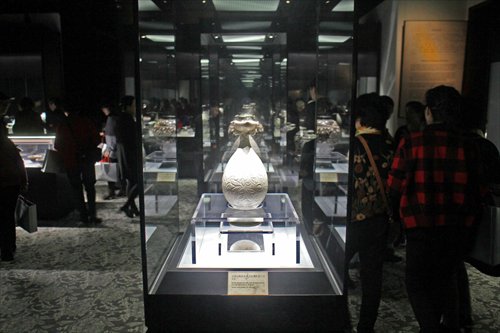China facing the collapse of private art museums

Private museums do not have a very long history in China, but in their short time in the country they have been booming.
Yet, despite this rapid growth in numbers, it seems that only a few have the ability to survive.
Claiming to be "the largest private museum" in China with its 6,600 square meters of exhibition space and more than 300 jades, porcelains and paintings, the Longsheng Museum closed down last month after operating for a little more than a year.
Earlier that same month, the Ullens Center for Contemporary Art (UCCA) in Beijing, which has been operating for eight years and is considered one of the most successful private museums in the Chinese mainland, announced it was going up for sale.
These news stories caused quite a stir throughout the art industry, leading many to start worrying about the health of the private museum industry in China.
Market woes
The Longshen Museum closed its doors due to the delayed payment of more than 6 million yuan ($903,000) in rent. It is currently unknown if the museum will reopen.
Longsheng is not the only museum facing a financial crisis. The Rongbaozhai Group, famous for traditional Chinese paintings, stationary and auctions, fell into a more than 50 million yuan crisis during the first half of this year.
Growth in the first three months of the year was faster than expected, with an expansion of 1.7 percent in annualized, price-adjusted terms. But in the months after that, slowing growth in China and Britain’s vote to leave the European Union weighed on the economy, and investors flocked to the Japanese currency, causing it to gain strength — and sap momentum from the Japanese economy.
Startups, including success stories Facebook and Twitter, often suffer founder clashes, executive churn, and squabbles over equity. But at Hyperloop One, a high-profile company spawned from an idea by Tesla founder and CEO Elon Musk, things got very toxic, very fast. The dueling lawsuits and lurid accusations threaten to sully the company's idealistic mission to create a new form of transportation
“Learn to speculate, because they’re going to be creating a lot more bubbles in the future.”
Heinberg: Is the Oil Industry Dying?

The peak oil controversy stages a comeback as the industry confronts a future of higher costs — and low prices. A spindletop spouter gushes oil in 1902. (Image: Wikimedia Commons) Talking about “peak oil” can feel very last decade. In fact, the question is still current. Petroleum markets are so glutted and prices are so low that most industry commenters think any worry about future oil supplies is pointless. The glut and price dip, however, are hardly indications of a healthy industry; instead, they are symptoms of an increasing inability to match production cost, supply, and demand in a way that’s profitable for producers but affordable for society. Is this what peak oil looks like? Back in the early years of the current millennium, I was among a handful of authors warning that world petroleum production rates would soon hit a maximum level and start to decline, and that […]




